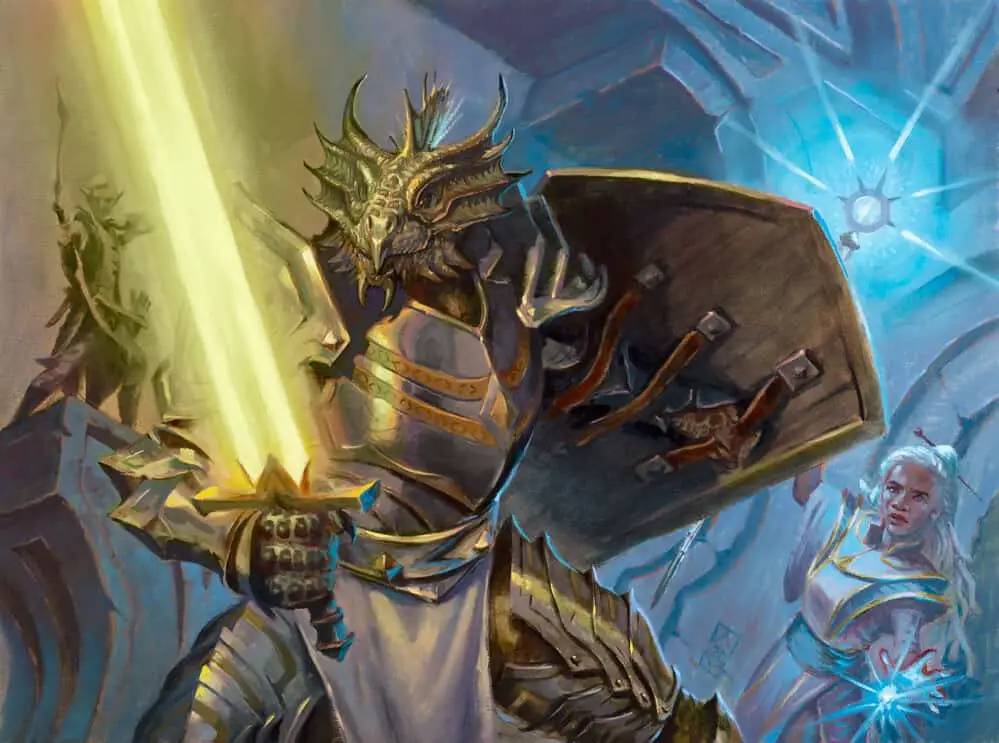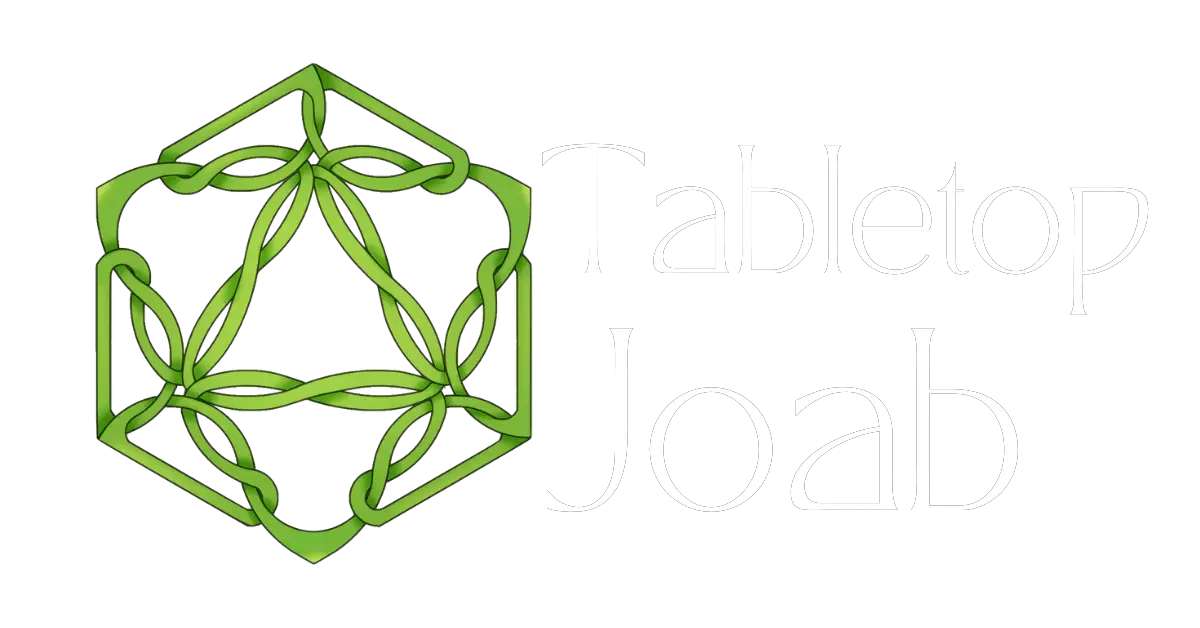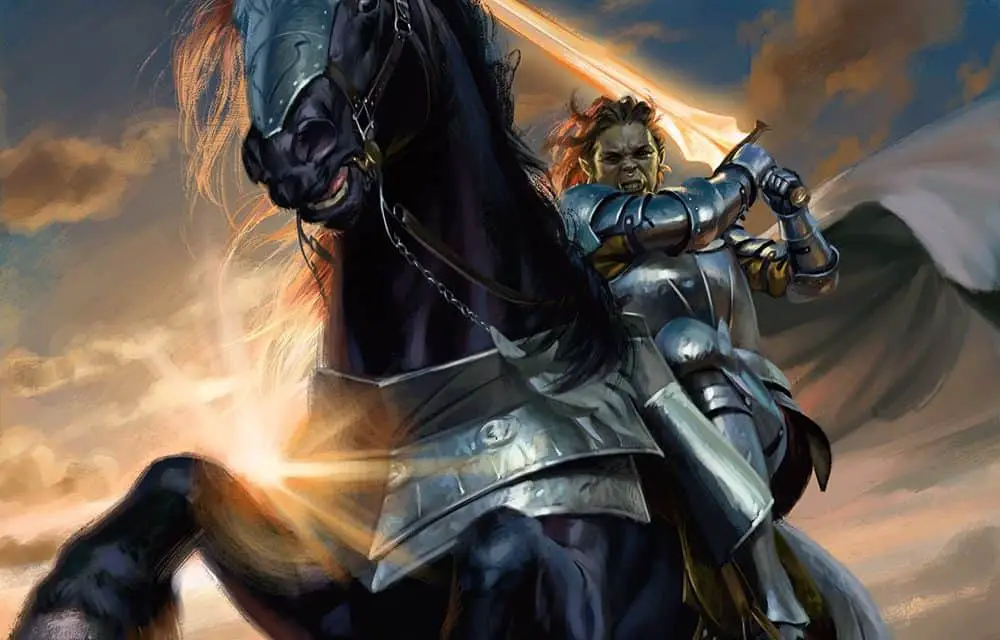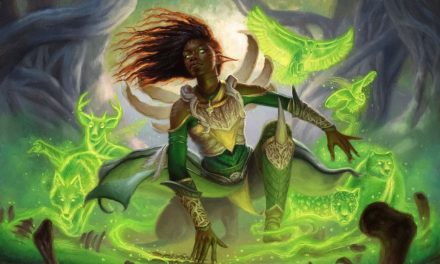Oath of Devotion Paladins are called and favored by the gods to uphold all that is good in the world. Wherever wickedness and evil are found, these Paladins will stop at nothing to destroy them.
These are bold knights who hold themselves to the highest standards of morality. Tempering their strength with faith and a strict moral code, their dedication to their beliefs is unwavering.
Do you wish to be both a light and a shield for those around you? Are you prepared to stand against the forces of evil in pursuit of peace and justice?
Then this article is for you!
This is the full guide to the Oath of Devotion Paladin in D&D 5e!
What is the Oath of Devotion Paladin in D&D 5e?
The Oath of Devotion Paladin is one of the three Paladin subclasses that appear in the Player’s Handbook.
In many ways, the Oath of Devotion is the truest idea of what a Paladin is.
Devotion Paladins have sworn themselves to a life of honor, morality, and service to their deity. These are the divinely favored warriors who act in service of their deity, justice, and the greater good.
Oath of Devotion Paladins frequently wear armor that is adorned with symbols of their deity. Heavenly and celestial themes are most common such as angel wings and halos.
Even more than kings or organizations, these Paladins have fully devoted themselves to the highest of ideals. With unwavering faith, they are paragons of justice, light, and hope in even the darkest of times.
Tenets of the Oath of Devotion
All Paladins must live by and honor the code to which they’ve sworn their Sacred Oath.
The tenets of the Oath of Devotion Paladin focus heavily on the virtuous behavior that is expected of these warriors. Paladins are blessed with great power and the Oath of Devotion commands that with equally great responsibility.
These are the values that Oath of Devotion Paladins hold most dear:
- Honesty: Don’t lie or cheat. Let your word be your promise.
- Courage: Never fear to act, though caution is wise.
- Compassion: Aid others, protect the weak, and punish those who threaten them. Show mercy to your foes but temper it with wisdom.
- Honor: Treat others with fairness, and let your honorable deeds be an example to them. Do as much good as possible while causing the least amount of harm.
- Duty: Be responsible for your actions and their consequences. Protect those entrusted to your care and obey those who have just authority over you.

Role in the Party
The Oath of Devotion Paladin is best on the party’s front lines.
Like all Paladins, you’re capable of dealing some very impressive burst damage with your Divine Smite and melee combat abilities.
However, you also have great defensive features and spells that are perfect for helping your party weather an enemy assault.
Especially if the party finds themselves going up against fiends or undead, you’ll want to be the one taking point in most encounters. Between your spells, subclass features, and the allies that you rally to your side, you can stand strong knowing that your deity has your back!
Oath of Devotion Paladin Features 5e
So, let’s take a closer look at the features you gain as an Oath of Devotion Paladin.
As I mentioned, you get a solid kit by any measure. However, this is especially suited towards adventures where you’ll be fighting plenty of fiends and undead!
Oath of Devotion Spells
Your Sacred Oath grants you bonus spells meant to help you build on your subclass’s theme.
At each of the levels that you see on the table, you gain bonus spells. These spells are always prepared and don’t count against the number of spells you can prepare each day.
If a spell isn’t from the Paladin spell list, it still counts as a Paladin spell for you.
| Paladin Level | Oath Spells |
| 3 | Protection From Evil and Good, Sanctuary |
| 5 | Lesser Restoration, Zone of Truth |
| 9 | Beacon of Hope, Dispel Magic |
| 13 | Freedom of Movement, Guardian of Faith |
| 17 | Commune, Flame Strike |
Thoughts on the Oath of Devotion Spell List
Most of your Oath of Devotion spells are more on the situational side. They aren’t bad, but you’ll mostly be using your spell slots for smiting.
The best of the lot are the ones you get right from the beginning.
Sanctuary can be a lifesaver and only takes a bonus action which can let you quickly bail an ally out of trouble. Protection from Evil and Good is one of my favorite defensive spells and can completely shut down enemies’ tactics against the target!
Lesser Restoration isn’t a bad spell, but best left to the party’s primary casters. Your Lay on Hands feature should cover most issues just fine without requiring your precious spell slots. Meanwhile, Zone of Truth is incredibly situational but can be useful in roleplaying encounters if you’re clever.
It’s good to have Dispel Magic in your back pocket but that’s also a job for a full spellcaster. If you need it and have no other option, it’s okay to have. Beacon of Hope is good when the chips are down but realistically you shouldn’t be needing this too often.
Freedom of Movement is great in situations where it’s actually useful.
I really want to like Guardian of Faith but I just can’t. It’s a cool idea but the damage is nothing particularly impressive (especially at the level that you’re getting it.)
Lastly, Flame Strike is a solid AoE spell that addresses the crowd-control issue that Paladins face. However, you’re getting this at level 17 and its damage just doesn’t hold up quite as well at these higher levels.
Handy for dealing with minions, I suppose?
Commune can be a great deal of divination utility depending on what questions you’re asking. It fits the theme of this subclass well and is a solid addition to the list.
Related: The Best Paladin Spells By Level in D&D 5e!
Channel Divinity (Level 3)
You can use your Channel Divinity once per short or long rest. You’ve got two options for how to use this.
Sacred Weapon: As an action, you imbue one weapon you are holding with positive energy. For 1 minute, you add your Charisma modifier to attack rolls made with that weapon (minimum of +1).
The weapon also emits bright light in a 20-foot radius and dim light 20 feet beyond that. If the weapon is not already magical, it becomes magical for the duration.
You can end this effect on your turn as part of any other action. If you are no longer holding or carrying this weapon, or if you fall unconscious, this effect ends.
If an enemy has a high Armor Class or you’re just having one of those nights where your dice aren’t cooperating, it’s worth the action to get the extra boost to your attack rolls.
One minute is plenty of time for a combat encounter, but you might want to take a short rest pretty soon after the fight to regain this!
Turn the Unholy: As an action, you present your holy symbol and speak a prayer. Each fiend or undead that can see or hear you within 30 feet of you must make a Wisdom saving throw. If the creature fails its saving throw, it is turned for 1 minute or until it takes damage.
A turned creature must spend its turns trying to move as far away from you as it can, and it can’t willingly move to a space within 30 feet of you. It also can’t take reactions.
For its action, it can use only the Dash action or try to escape from an effect that prevents it from moving.
If there’s nowhere to move, the creature can use the Dodge action.
If there’s one thing that the Undead especially like to do, it’s swarm. When you’re getting dogpiled by fiends or undead, this is very powerful!
Remember that enemies are making their saving throw against your Paladin Spell Save DC. A higher Charisma will make it harder for them to resist!

Aura of Devotion (Level 7)
Your unwavering devotion to your deity and ideals protects both you and those close to you. No longer will the honeyed words of enchanters take hold of your mind!
You and friendly creatures within 10 feet of you can’t be charmed while you are conscious.
At level 18, the range of this aura increase to 30 feet.
There are a ton of Charm effects in D&D 5e and they can frequently spell disaster for a party.
Especially considering that you’re likely working as the party’s tank, it can get very bad if you fall under the charms of a Succubus (or Incubus), Harpy, or some other creature!
Passing this feature on to those near you makes it even more incredible.
You probably won’t be using this often, so don’t forget you have it when an enemy is trying to enchant you or your allies!
Purity of Spirit (Level 15)
Certainly the strongest feature of the Oath of Devotion Paladin, this is a little description with a huge effect!
You are always under the effects of a Protection From Evil and Good spell.
Let’s look at why this is so amazing…
First thing first, you have protection against SIX types of creatures!
Specifically:
- Aberrations (like Aboleths, Beholders, and Mind Flayers)
- Celestials (if you end up fighting against angels, devas, or unicorns)
- Elementals (this also includes creatures like Genies!)
- Fey (like Pixies, most Hags, Eladrin)
- Fiends (demons and devils)
- Undead (like zombies, specters, vampires, etc)
Creatures of those types have disadvantage on attack rolls against you. Plus, you can’t be charmed, frightened, or possessed by them!
Despite a bit of redundancy with your Aura of Devotion, this is pretty freaking amazing!
The list of creatures you have PERMANENT protection from covers a huge chunk of whatever can be thrown at you. The best that most creatures can hope for when attacking you is to just roll normally.
As far as buffs go, this is just mind-blowingly great.
Holy Nimbus (Level 20)
At level 20, your devotion can shine through in even the darkest of moments. You’re a light for all those around you and a beacon of radiant judgment upon your enemies!
As an action, you can emanate an aura of sunlight. For 1 minute, a bright light shines from you in a 30-foot radius and dim light shines 30 feet beyond that.
Whenever an enemy creature starts its turn in the bright light, the creature takes 10 radiant damage.
In addition, for the duration, you have advantage on saving throws against spells cast by fiends or undead.
Once you use this feature, you can’t use it again until you finish a long rest.
10 damage might not seem like much but notice that there’s no save against this.
1 minute is plenty of time for most combat encounters which means that every enemy within 30 feet of you is taking that damage at the start of their turns no matter what.
The damage will definitely add up and can easily clear out enemy minions while you focus on the biggest threat!
Sweetening the deal by gaining advantage on saves versus spells from fiends and undead makes this even more fantastic. Whether you’re taking on Demon Lords, Archdevils, or Liches, this will greatly tilt the odds in your favor!

Connections
When you’re making an Oath of Devotion Paladin, it’s worth putting some extra thought into your character’s backstory.
At their core, these are characters that are wholly committed to their faith, ideals, and cause. There are many reasons that someone might swear an Oath, but the Devotion Paladin feels their Sacred Oath very deeply.
This kind of commitment doesn’t just happen by chance.
Were you raised in a temple and trained from a young age to become what you are today?
Did you have a less-than-good past, but something happened that made you see the light and vow to turn over a new leaf?
Consider where your character has come from and why they would devote themselves so fully to their deity or cause. How does joining the party and going on the adventure fit with their cause?
Is the Oath of Devotion Paladin Good?
The Oath of Devotion Paladin is an all-around solid subclass. As the quintessential Paladin, they are a great addition to any party!
However, Devotion Paladins are at their best when an adventure gives them plenty of undead and fiends to fight.
You’ll be using your spell slots to power your Divine Smite most of the time. But don’t ignore the defensive power of Sanctuary and Protection from Evil and Good!
Much like the Oath of the Ancients Paladin, Devotion Paladins are very beginner-friendly while still being interesting for experienced players. They’re pretty straightforward with a good spread of useful options.
Additionally, there’s not really a “right” or “wrong” way to build an Oath of Devotion Paladin. While some of the Paladin subclasses tend to favor a certain build or playstyle, the Devotion Paladin can easily fit whatever you think is most interesting for your character.
Just don’t neglect your tenets.
While that’s true advice for any Paladin, it’s especially true for those taking the Oath of Devotion!
Want to see how the Oath of Devotion Paladin stacks up against the other Sacred Oaths?
Check out the full ranking of every Paladin subclass in D&D 5e!
Conclusion – Oath of Devotion Paladin in D&D 5e
Do you have what it takes to let your faith guide you on the straight and narrow path?
Most of the Paladin subclasses certainly lean towards encouraging certain alignments, but there’s usually some gray area. In many ways, the Oath of Devotion Paladin is the exact definition of what a Lawful Good aligned character is.
Even for those who aren’t playing a Devotion Paladin, I think the Oath’s tenets do a pretty good job of outlining how to be Lawful Good without necessarily falling into the dreaded “Lawful Stupid” territory.
But I’m just musing and rambling at this point…
What are your thoughts on the Oath of Devotion Paladin in D&D 5e? Let’s chat in the comments!
Don’t forget to sign up for the Tabletop Joab newsletter! It’s the best way to get all the latest player guides, DM Tips, news, reviews, and more for D&D 5e right to your inbox!
You can also follow me on Facebook and Twitter.
If you found this article helpful and want to support the site, you can buy me a coffee here! (It’s not expected, but very appreciated!)










Recent Comments